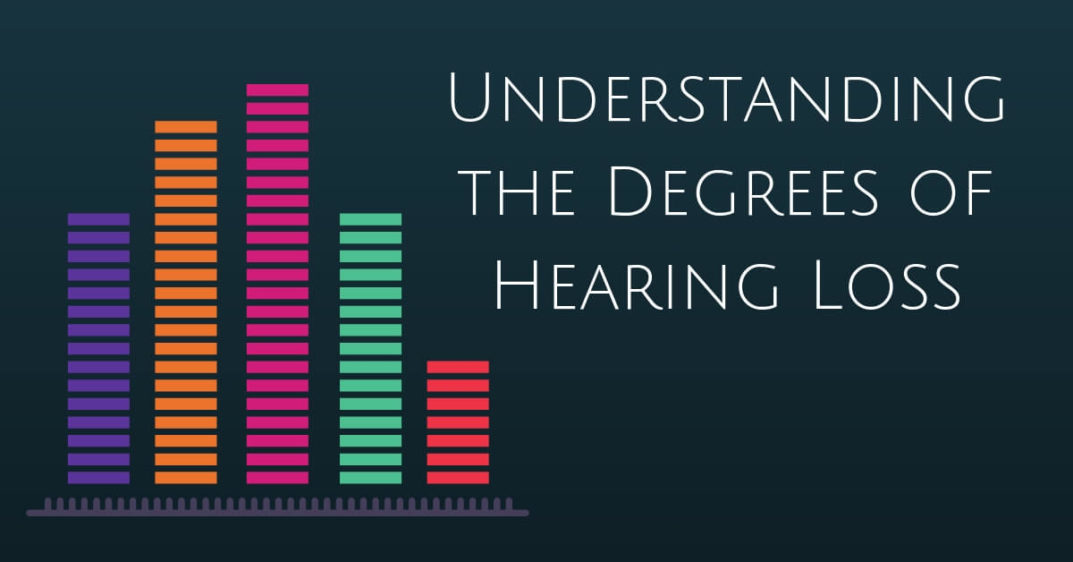Hearing loss can be caused by many different factors, from genetics to the natural process of aging to exposure to sudden or prolonged loud sounds. At the same time, hearing loss does not affect all people in the same ways. Hearing health professionals have therefore devised ways of testing hearing loss and ways of measuring the levels of hearing loss in order to create a more common language for understanding this disability. One factor in hearing loss is the degree, which indicates the severity of the condition.
Understanding Hearing Loss
There are three types of hearing loss: conductive, sensorineural, and mixed (which is, of course, a mixture of the conductive and sensorineural) hearing loss. Conductive hearing loss occurs when there is a blockage between the outer ear, the middle ear, and/or the inner ear, making it difficult for sound waves to travel throughout your ear and to the brain.
Sensorineural hearing loss occurs when cochlear hair cells in the inner ear become damaged or when there are not enough of them. Sensorineural hearing loss is often caused by exposure to loud sounds. In mixed hearing loss, there is often a problem with how sound is conducted to the inner ear (as with conductive hearing loss), and a problem with the hair cells that line the inner ear (as happens in sensorineural hearing loss).
Other forms of hearing loss occur when the brain has difficulty processing the information that sound contains. These are categorized under the broad umbrella of “auditory processing disorder,” where the brain cannot make distinguish where sounds are coming from, making it difficult to distinguish one sound from the next, and/or where the brain cannot make sense of how sounds are ordered so that it is hard block out background noise to understand a conversation.
Decibels and Hearing Loss
No matter the type of hearing loss, it is measured in decibels hearing level (or dBHL). People can generally hear quiet sounds down to 20 dBHL—these sounds include things like the sound of a clock ticking, or the faint dripping of a leaky faucet. Hearing health professionals generally agree lasting or repeated exposure to sounds at or above 85 decibels can cause hearing loss. (They also note that, the louder the sound is, the shorter the amount of time it takes for hearing loss to occur.) Eight-five decibels can include the sounds of heavy dump trucks rumbling by, whereas motorcycles can clock in at upwards of 95 decibels. Headphones are huge culprits of noise induced hearing loss, and can oftentimes reach 103 decibels and more. Explosive sounds of fireworks as well as guns can reach 150 decibels.
The best way to understand your level of hearing loss is to get a safe and non-invasive hearing test, offered by Comprehensive Ear and Hearing. Our team will administer the test in a quiet room, providing you headphones through which you will hear different sounds of a variety of tones, frequencies, and noise levels. We will then make the assessment of your hearing abilities based on the five main degrees of hearing loss:
- Normal hearing
Where you can hear quiet sounds down to 20 dB HL. - Mild hearing loss
With this degree of hearing loss, you are experiencing hearing loss in your better ear somewhere between 25 and 39 dB HL. You may able to hear but have difficulty following someone else’s speech—especially in noisy places. - Moderate hearing loss
With this degree of hearing loss, you hear in your better ear between 40 and 69 dBHL. This means you likely have difficulty following speech without using a hearing aid. - Severe hearing loss
With this degree of hearing loss, hearing loss in your better ear exists between 70 and 89 dB HL and requires a pretty powerful hearing aid or even an implant. - Profound hearing loss
With this degree of hearing loss, anything softer than 90 dB HL will be difficult to hear. You may need to rely mainly on lip-reading and/or sign language, or an implant.
Seeking Treatment for Hearing Loss
Hearing loss affects everyone differently, and the only way to have an accurate understanding of your hearing abilities is to visit us at Comprehensive Ear and Hearing. We provide comprehensive hearing tests, and if hearing loss is detected, our team will help you understand the degree of hearing loss that you experience.
Visiting us at Comprehensive Ear and Hearing is a key part of maintaining healthy hearing habits, as well as a larger, holistic health practice. If you have a hearing loss, we will work with you to find the best treatment to improve your overall quality of life.


